The one-year anniversary of Al Davis’s death passed on Monday. I posted the story and interview below on October 8, 2011. It remains one of my greatest AFL experiences, and I thought it worthy to be brought up again. If you have already read it, take another look. I did, and enjoyed it just as much the 25th time around. If you have not yet read it, sit back and enjoy!
As a young Charger fan growing up in the heyday of Kellen Winslow, Dan Fouts and “Air” Coryell, I learned to hate the Raiders and Al Davis. To everyone that bled blue and gold, Davis, clad in silver and black, embodied all that was evil in professional football. His teams were built of tough guys, rejects some called them, who played hard, sometimes dirty, and seemingly always won.
Later in my life, once I was able to look at professional football from a less passionate and more all-encompassing viewpoint, I came to appreciate Al Davis more for his many contributions to the game that I loved. His intensity and willingness to do what it took to win was admirable. His influence as commissioner of the American Football League was brief, but intense. It was during his tenure that the merger with the NFL was accomplished.
I had dreamed of speaking with Al Davis for my book, Charging Through the AFL. Davis had been a Chargers assistant from 1960-1962, and was responsible for signing many of the early Chargers greats, including Lance Alworth. But now Davis was an icon, and someone who interacted with the most powerful media outlets in the world, strictly on his own terms. What were the chances that a young, unpublished, unknown hoping-to-be-author would ever get time with Davis? Slim-to-none, were my bet.
The one thing that I had going for me was a good relationship with Lance Alworth. I had first met Lance when I was writing my master’s thesis on Sid Gillman, and we were reacquainted when I was doing the research for Charging. One day Lance and I were talking about the progress that I was making with my research. I told him of the roughly 50 former Chargers that I had interviewed, and how much I enjoyed speaking with them. I also mentioned how much I wished that I could speak with Davis. “Have you tried calling his office,” Lance asked. “Sure,” I replied, “several times. But I’ve never gotten a return call.” Lance then told me that he would see what he could do. It had been a while since he had spoken with Al, and he would give him a call to catch up. He would also ask Al if he could spare me a bit of his time.
Later that week I was sitting at home when I received a phone call from the Oakland Raiders front office. The woman on the phone introduced herself as Al Davis’s secretary, and said that she was inquiring about the interview that I would like to have with Mr. Davis. I told her about the book that I was writing, and how I wanted to speak with Mr. Davis about his time with the Chargers. She could not guarantee that Mr. Davis would speak with me she said, but would pass along the information. I thanked her, and hoped for the best.
A few days passed, and my attention shifted from the 1960s Chargers to the impending birth of my son, Will. My wife had been scheduled for a 9:00 AM cesarean delivery, and so off we went, bright and early one morning, to bring our little boy into the world. The procedure went flawlessly, and by 11:00, we had a brand new member of our family. Later that afternoon, sitting in the recovery room with Kym, our baby, and a gaggle of friends and family, my cell phone began to ring. The readout showed a long-distance number that I did not immediately recognize. Thinking it was an out-of-state family member calling to congratulate us on the birth, I answered the phone and stepped out of the room. My heart skipped a beat when Al Davis’s secretary responded, and said that Mr. Davis had some time right then to do our interview.
“Oh, Hell,” I thought, “I am about to tell Al Davis that I am busy and can’t come to the phone.”
“I am so sorry,” I began, “but my wife just gave birth. I am standing outside the recovery room, and there is just no way that I can do this right now. Is it at all possible to reschedule?” She got a good laugh out of that one, but lucky for me, she was laughing at the situation, and not at my hopes for postponing the interview. She said that we could do the interview in a couple of days. Mr. Davis would understand. I thanked her profusely, and went back to my family.
Two days later, she called me back to reschedule. She said that Mr. Davis would have time that afternoon. Not wanting to tempt fate more than I had to, I graciously accepted. I told her that we were leaving the hospital that morning, and we should be back home by early afternoon.
Check-out went smoothly. Kym, not one to sit still for long periods of time, was up and on her feet, walking gingerly, but well. Will was doing just fine, and after signing the appropriate paperwork and ensuring the nurse that we knew how to use the car seat, we took our little bundle home. We had just walked in the door, and gotten Kym and Will settled on the couch when the phone began to ring. I walked over and looked at the caller I.D., which read “OAKLAND RAIDERS FOOTBALL CLUB.” I answered the phone and Mr. Davis’s secretary asked me how Kym and the baby were doing. I thanked her and assured her that they were well. “Mr. Davis will be ready to speak with you soon,” she said, and gave me a number to call back in 15 minutes.
I spent the next 15 minutes scrambling from Kym to Will to my notes, making sure that everything was in order before I left my wife and newborn son for a 30 minute telephone conversation with one of the most influential football men in history.
I am happy to say that my interview with Al Davis went flawlessly. I was amazed by his memory. His recollection of the players that he had scouted more than 40 years prior was incredible. His stories were insightful, interesting, and had a cool hint of arrogance. It was all that I had hoped it would be and more.
I give to you now, my full and uncut interview with Al Davis. That you all for reading, and thank you Al for everything.
TT – Lance Alworth came to the Chargers in a deal with the Raiders. Can you describe the process of recruiting and then trading for his rights, drafting and signing Alworth?
AD – Yes. We had drafted Lance in a prior draft that was ruled not legal. So that draft was thrown out. In the second draft that year, the Oakland Raiders had drafted him, number two, I think, in their draft. Because they were much lower than us in the draft, they had the rights to him. But we traded Bo Roberson and several players for Lance because I thought Lance would be a brilliant athlete and a brilliant performer. It was unique that it was in November. I think it was November; we had a bye week. The Chargers did. We were in San Diego. We had moved from Los Angeles, and I was gonna go down to see Lance on that bye week. I was going down to Arkansas to see him. I got a call in the middle of the night, and I thought it was the planes calling to say that the weather had changed and they couldn’t go out. But it was a call that was probably the worst call I have ever had in my life; that my father had died. So I went to the funeral back East, and then late in the week I went down to see Lance and met him for the first time. I started to sell him on the Chargers, a young team, a young city, a young league, grow with it, and then of course the point that I would be coaching him. I had the ability to sell the great Sid Gillman, and of course the owner of the team, Barron Hilton.
TT – I know that in speaking with Lance that he had been drafted by the 49ers in the NFL.
AD – That’s right. TT – He told me that he was interested in playing ball on the West Coast. Now what were some of the specific selling points that you used selling the Chargers to Lance? It was a new league at the time. The team could have been perceived as unstable since they had just moved from Los Angeles, whereas the 49ers had been around for quite some time and at least had some stability.
AD – Well, no, we were not an unstable team. On the contrary, we were very stable. We had signed some brilliant young players like Charlie Flowers from Mississippi, Earl Faison from Indiana, Keith Lincoln, a lot of great young players. And the class that we were bringing in when Lance’s class came in… I like to call it a class… Had John Hadl and had some great young players in addition. So we had Ernie Ladd. I don’t know if you know who Ernie Ladd was. TT – Absolutely. I have spoken with Ernie.
AD – Ron Mix, we had Ron Mix, we had Ernie Wright. We had all the earmarks of a truly great football team. As I said, it would be a young team, we would be going to a new city with a new league, and the idea was to grow with it. Of course we had great coaches and we had me.
TT – Alworth had been a running back at Arkansas. What did you see in him that made you move him to flanker? Had that been the plan in drafting him or did that become apparent once he began working out for the Chargers? AD – No, no, no. I had seen him play as a junior. I had seen him play as a sophomore. And obviously had him positioned for a wide receiver early on in his college career. He had great speed, he had great leaping ability, and while some people questioned his hands, they became great as well. But also I think one thing that he had was tremendous confidence. A very interesting story that might interest you. I think it was in 1962; Lance had just come in from the all-star game. We were going to play a preseason game at night. I think it was a Saturday night and they played the all-star game on Friday night. Sid said we were going to start Alworth. I said that we would just give him some basic stuff, but I really didn’t want to do it because the guy that had been playing the position had really worked hard the whole training camp. But Sid started him anyhow because we wanted to attract attendance. The guy that had worked real hard the whole training camp was a guy named Jerry Richardson. He now owns the Carolina Panthers.
TT – Once you got to the Raiders, how did you instruct your team to defend against Alworth? AD – Well, we could double him up from time to time. We could jam him at the line of scrimmage, which was brand new in those days, which we called a pressure defense. They now call it the bump-and-run. We had gotten the idea from John Wooden at UCLA, when they played pressure defense with Hazard and Goodrich. In other words they got up and destroyed the routes, the timing routes. And in those days you could jam a player all over the field. So that was one thing, but I was also committed in 1963, that what I would have to do was get great corners. Otherwise you couldn’t play the Chargers. We did get great cornerbacks. The great Willie Brown, who is in the Hall of Fame. But Lance was just a great player, a brilliant player. And he was tough to stop. Look at his records. And people were trying to stop him, but he had great records.
TT – And when you take into account the amount of talent the Chargers had with guys like Kocourek and Norton and Lincoln and Lowe… AD – Well, just wait one minute now, Todd. There is a difference with some of the names you just put out. Some of them are fine football players, but Lance was greatness that would become a standard of excellence that a lot of players would be measured by. TT – Oh, I agree with you completely. My point was just that they had so many options.
AD – OK. I’ll let it go at that. But he made a lot of those options become real. TT – OK.
AD – Do you understand what I mean? TT – I believe so. AD – What?
TT – I believe so. AD – What? What do I mean?
TT – I believe that you mean that because Lance was so great, other teams had to focus on defending him and that opened up other possibilities for the Chargers with other players. AD – OK, you win. That’s it. TT – OK. You have said in the past that Lance Alworth was one of two or three players in your entire career that have had what you call “it.” Can you better define “it?” Who are the other players?
AD – No, I’d rather not tell you who the other players are, but to give you an idea, I had Bo Jackson. I’ve had so many great players that when I made these statements, that must have been 20 years ago. Is that possible? TT – Yes, it is.
AD – But Lance seemed like he was a guy that was born with great ability, and all he needed to do was put it to use. And he had it. He just had it from the word go. All you had to do was refine and define it. With his hard work, with his willingness to work and our willingness to see that it worked, because obviously it would help our careers. TT – Do you mind if I ask you a couple of questions about the Chargers in general?
AD – Well, I don’t… Well go ahead and let me see where you are headed. 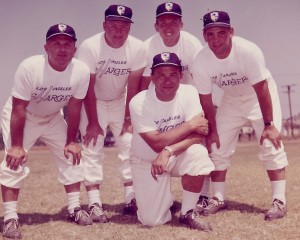
TT – You, Chuck Noll and Sid Gillman are in the Pro Football Hall of Fame. Jack Faulkner has spent more than 40 years in pro football; Joe Madro spent more than 20 years. After working on that staff for a period, could you tell that this group was special? AD – Oh yeah they were special. There is no question about it. I was only with them in 1960, 1961 and 1962. But I had to compete against them the rest of my life. And they were special, there’s no question about that. It was probably one of the greatest staffs of all time. For a small staff of only five people, for three of them to be in the Hall of Fame, and I think between Chuck and myself we have nine super bowls. That’s a lot of super bowls. But Sid was really the catalyst.
TT – Tell me about when Sid Gillman first approached you about coaching the Chargers and how you came to the team. AD – I was coaching at the University of Southern California. One night I came home. It was about 11:30 at night. My wife, Carol, said, “Sid called.” And Sid and I used to talk all the time. And he liked you to call him no matter what time you got in. So I called him about one in the morning. I told him that I hoped I wasn’t disturbing him. He said, “No, no, no, I was waiting for the call.” He says, “I’m going to go over and take over this Charger team in this new league, the American Football League, and I’d like you to come along.” And I said, “Well, what are you thinking? What would I coach?” He said, “I’m not sure exactly who I’m gonna hire yet, but I’ll let you say where you want to coach.” And I said, “Well I coached the defense, I was the defensive coordinator at Southern Cal, but I really want to go back on offense, the passing game.” He said, “OK you’ve got it if you’ll come.” I said, “Gimme a week.” And I took a week and I said I would come.
TT – Was learning Gillman’s offensive theories a major factor in you deciding to accept the Chargers’ job offer? How do you think you benefited by working for Gillman? AD – No, I knew Sid’s offensive theory a long while. That was not the factor. The factor was working with him. We were gonna build a young team in a new league. I had opportunities in the National Football League and opportunities in college. But I liked the idea of it. I liked the idea because I also could recruit a lot of the players.
TT – I have spoken with a number of them that you recruited and signed. AD – What?
TT – I have spoken with a number of them that you recruited and signed. AD – Of those great teams in the early years, I’d say we got most of them. From Paul Lowe to Keith Lincoln to Ron Mix. Did you ever talk to Sam DeLuca?
TT – I did. I spoke with Sam DeLuca. AD – Don Rogers?
TT – I spoke with Don Rogers as well. AD – All those kids. Ernie Ladd.
TT – Yes, I spoke with Ernie Ladd, Earl Faison. AD – Signed’em all.
TT – Ron Nery. AD – Ron Nery died, didn’t he?
TT – He did. He died about two years ago. AD – Was he still married?
TT – Not to his original wife.
AD – No, you didn’t think so.
TT – Apparently he went through an ugly divorce he told me. I spoke with him about nine months before he passed away.
AD – Terrible. I signed Paul Lowe in the middle of the night.
TT – Tell me about signing Paul Lowe. He had been a castoff of the 49ers. AD – Yeah, but he was a great talent. In those day there were many castoffs, which was proven by having the new league. He just had great ability. And what really got him going was the weight programs that we had. That really developed his body. He was a very explosive player. God, he and Lincoln were explosive players.
TT – You got two years to coach the two of them. Didn’t Lincoln come in ’61? AD – Yes. Lincoln came in ’61. He was a number two choice. Earl Faison was number one. The thing is that I missed Lincoln. I missed Keith when I came to the University of Southern California. Keith had already signed at Washington State. I couldn’t get him. But he was really good. I think he was from Monrovia.
TT – I think you are right. Earl told me a story about his signing with the team, that you guys brought him into a hotel room. I believe it was the penthouse suite at the Beverly Hills Hilton Hotel. AD – That’s what it was.
TT – You threw about, I think he said fifteen hundred-dollar bills on the bed and said, “Earl, this could all be yours if you sign with the team.” And then Esther Gillman led him out to the balcony and showed him all of downtown L.A. at that point and told him that he could be the king of L.A. if he signed with the Chargers. AD – Earl, he did well.
TT – He did. Absolutely. After finishing 1-13 in 1962, the Raiders went 10-4 under your guidance in 1963, including two wins over the Chargers. What were the key changes that you made to produce such a turnaround? AD – Oh, I don’t want to go into Al Davis and the Raiders.
TT – OK. AD – No. We’re talking about the Chargers and Lance. One thing I want to point out to you. The first time the Cowboys won the Super Bowl, the Dallas Cowboys, Lance was one of the receivers. You’re aware of that.
TT – I am. AD – But do you know that Lance caught the first touchdown in the game?
TT – Yes, I do. Lance said that it was kind of ironic because when he first met with Tom Landry, Landry told him that he had brought Lance to Dallas to block. AD – To block, yes.
TT – I don’t think Lance was terribly thrilled with that. AD – Well, Lance was a great blocker.
TT – Yes, and obviously did his job and did it well. Then they went on to win the super bowl that year. AD – You got what you need, Todd?
TT – I did, and I appreciate your time very much. Do you think there are any points that I missed, or anything that you would specifically like to mention about your time with the team? AD – No, there’s a lot. I just am not in a position to do that right at the moment so much. But I have so many great memories with those players and all, and from time to time I have responded to them when they have needed things. The door was always open because that’s how we built the league. The Chargers were the flagship of the American Football League.
TT – I have talked to several of the players and they all think very highly of you. Walt Sweeney and Lance, in particular, went on and on about how much you have meant to them and what a great friend you have been.
AD – Walt Sweeney is another who truly… Walt Sweeney, if he didn’t go through the unfortunate problems personally, would be in the Hall of Fame.
TT – I think you’re right. AD – You know, Lance was the first player to go into the Hall of Fame from the American Football League.
TT – Yes, and I know that he asked you to give his introduction speech. AD – Yep.
TT – That must have been a neat honor for you. AD – It certainly was. It was an honor because he was a guy that was a high school all-American, a college all-American. He was an all-pro player. I can remember making the speech at the end. It was really great.
TT – And then Ron Mix followed him the very next year. AD – Yes, Ron… I was in on the switch when I coached at Southern Cal. Ron was a tight end and I was the one forerunner to move him to tackle.
TT – How did he take that? He went from tight end, which can be somewhat of a glory position to… AD – Oh, he liked it.
TT – Did he? AD – Oh yeah, he liked it. He was just excellent. What a player. What players those guys were.
TT – I asked Walt Sweeney the same question because he went from a tight end to a guard. AD – Yep.
TT – He told me that obviously he would have done anything to make the Chargers, but initially he was kind of upset because he really liked catching footballs and he knew he wasn’t going to do a whole lot of that playing guard. AD – I’ll never forget Walter, when we were getting ready to draft him, Sid asked me, “Who’s he like?” And I said, “Sid, he’s like Ditka.” He was a tough son of a bitch.
TT – Yeah. Lance told me that if he had been a linebacker that he would have erased the name of Dick Butkus from the record books. AD – In all probability he would have done that. There’s no question. He was just a great player.
TT – Tell me about that first fearsome foursome. The Chargers had one of the biggest lines in football. AD – Not one of.
TT – I’m sure you’re right. With Bill Hudson…
AD – The idea was that they would be the biggest. Nery played right end. Big Bill Hudson, who I got out of Canada, played tackle. Ernie Ladd played tackle, and of course Earl played end. TT – That was a tremendous line. I have spoken with a number of the defensive backs that played during that period. And obviously they set the record for number of interceptions in a season.
AD – Is he still alive, Richard Harris? TT – Yes, he is. Dick Harris, yes he is. He’s down I believe in Long Beach. I have spoken with Dick several times. But they all credit that line as the reason that they set the record that year.
AD – Did you ever talk to Paul Maguire? TT – I did, briefly. He said that you had recruited him to the Citadel, and as soon as he signed on, you were somewhere else. But obviously he wasn’t too upset about it. He signed with you to play with the Chargers.
AD – Memories. Thanks a lot, Todd. I hope that you got what you wanted. If you talk to Lance, send my love. And to the rest of the guys, tell them I said, “hello.” Really. Just for a moment you go back in time and it seems like it was only yesterday when I start talking about all these guys. Really, it’s a unique experience. But thanks a lot, and good luck to you. TT – Thank you very much for your time. I truly appreciate it.
AD – OK, good.

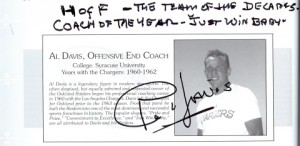
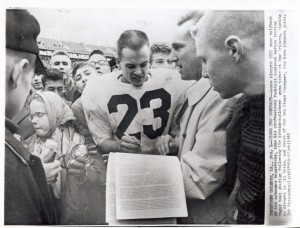
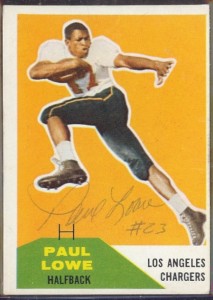
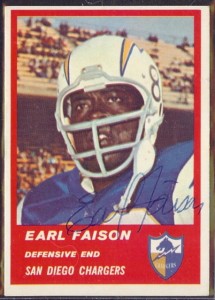
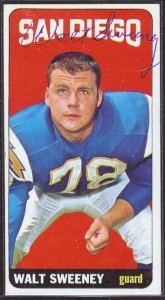
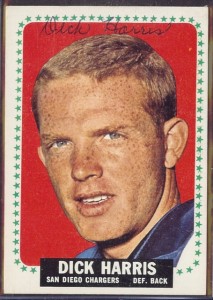
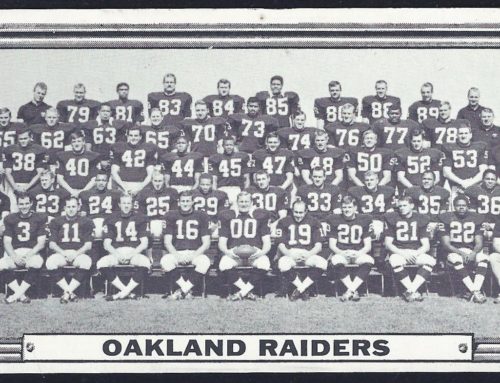
Awesome moment in time for you TT.
I’m sure you’ll never forget it.
That was a Great Read last year and I enjoyed it all over again just a few minutes ago.
Thank you & thanks to Lance for the assist!
Great read re Davis, Alsworth, Lowe, Mix et al. Played against all, some in college and then the pros. Great collection and assortment of talent. wonderful interview to bring back many memories….was lucky to play then and remember now!
Good article Todd. I’m glad that Al also thought that Walt Sweeney was Hall of Fame caliber. Al compared Walt to Ditka as a tight end. Never heard that before. Thanks again.
As a KC fan since the AFL days, I say with reverence Al Davis was a genius, most evident when his Raiders were regularly beating my Chiefs – 7 times in 10 tries – October 1966 – January 1970, albeit no cigar/Superbowl ring.
Davis also saw the greater potential a Clem Daniels & Warren Wells and knew there was still gas in the tank a Dave Grayson aft the Texans/Chiefs moved each player.
Al Davis passion for football was very evident… to me, Davis was the Lombardi of the executive branch football, but always a football mind.
… [Trackback]
[…] Here you can find 59461 additional Info to that Topic: talesfromtheamericanfootballleague.com/my-memories-of-al-davis-one-year-later/ […]
… [Trackback]
[…] Info to that Topic: talesfromtheamericanfootballleague.com/my-memories-of-al-davis-one-year-later/ […]
… [Trackback]
[…] Here you will find 41090 more Information to that Topic: talesfromtheamericanfootballleague.com/my-memories-of-al-davis-one-year-later/ […]
… [Trackback]
[…] Info to that Topic: talesfromtheamericanfootballleague.com/my-memories-of-al-davis-one-year-later/ […]
… [Trackback]
[…] Info to that Topic: talesfromtheamericanfootballleague.com/my-memories-of-al-davis-one-year-later/ […]
… [Trackback]
[…] Find More Information here on that Topic: talesfromtheamericanfootballleague.com/my-memories-of-al-davis-one-year-later/ […]
… [Trackback]
[…] Information to that Topic: talesfromtheamericanfootballleague.com/my-memories-of-al-davis-one-year-later/ […]
… [Trackback]
[…] There you will find 5891 additional Information on that Topic: talesfromtheamericanfootballleague.com/my-memories-of-al-davis-one-year-later/ […]
… [Trackback]
[…] Find More to that Topic: talesfromtheamericanfootballleague.com/my-memories-of-al-davis-one-year-later/ […]
… [Trackback]
[…] Find More on on that Topic: talesfromtheamericanfootballleague.com/my-memories-of-al-davis-one-year-later/ […]
… [Trackback]
[…] Find More Information here on that Topic: talesfromtheamericanfootballleague.com/my-memories-of-al-davis-one-year-later/ […]
… [Trackback]
[…] Read More Info here on that Topic: talesfromtheamericanfootballleague.com/my-memories-of-al-davis-one-year-later/ […]
… [Trackback]
[…] Info to that Topic: talesfromtheamericanfootballleague.com/my-memories-of-al-davis-one-year-later/ […]
… [Trackback]
[…] Read More here to that Topic: talesfromtheamericanfootballleague.com/my-memories-of-al-davis-one-year-later/ […]
… [Trackback]
[…] Read More on on that Topic: talesfromtheamericanfootballleague.com/my-memories-of-al-davis-one-year-later/ […]
… [Trackback]
[…] Read More to that Topic: talesfromtheamericanfootballleague.com/my-memories-of-al-davis-one-year-later/ […]
… [Trackback]
[…] There you will find 10544 additional Information on that Topic: talesfromtheamericanfootballleague.com/my-memories-of-al-davis-one-year-later/ […]
… [Trackback]
[…] Read More Info here to that Topic: talesfromtheamericanfootballleague.com/my-memories-of-al-davis-one-year-later/ […]
… [Trackback]
[…] Read More to that Topic: talesfromtheamericanfootballleague.com/my-memories-of-al-davis-one-year-later/ […]
… [Trackback]
[…] There you can find 44788 more Information to that Topic: talesfromtheamericanfootballleague.com/my-memories-of-al-davis-one-year-later/ […]
… [Trackback]
[…] Find More Information here on that Topic: talesfromtheamericanfootballleague.com/my-memories-of-al-davis-one-year-later/ […]
… [Trackback]
[…] Read More Info here to that Topic: talesfromtheamericanfootballleague.com/my-memories-of-al-davis-one-year-later/ […]
… [Trackback]
[…] Find More to that Topic: talesfromtheamericanfootballleague.com/my-memories-of-al-davis-one-year-later/ […]
… [Trackback]
[…] Find More Information here on that Topic: talesfromtheamericanfootballleague.com/my-memories-of-al-davis-one-year-later/ […]
… [Trackback]
[…] Read More Information here on that Topic: talesfromtheamericanfootballleague.com/my-memories-of-al-davis-one-year-later/ […]